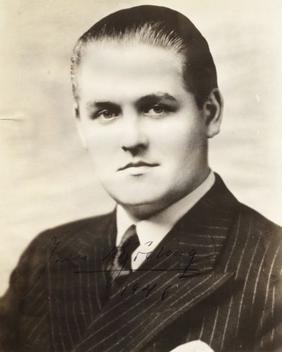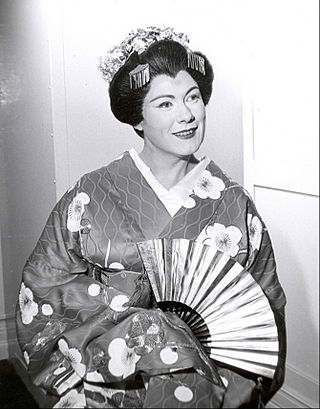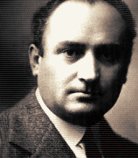Related Research Articles

Maria Callas, was an American-born Greek soprano who was one of the most renowned and influential opera singers of the 20th century. Many critics praised her bel canto technique, wide-ranging voice and dramatic interpretations. Her repertoire ranged from classical opera seria to the bel canto operas of Donizetti, Bellini and Rossini and, further, to the works of Verdi and Puccini; and, in her early career, to the music dramas of Wagner. Her musical and dramatic talents led to her being hailed as La Divina.

Johan Jonatan "Jussi" Björling was a Swedish tenor. One of the leading operatic singers of the 20th century, Björling appeared for many years at the Metropolitan Opera in New York City and less frequently at the major European opera houses, including the Royal Opera House in London and La Scala in Milan. He sang the Italian, French and Russian opera repertory with taste.

Mario Del Monaco was an Italian operatic tenor.

Franco Corelli was an Italian tenor who had a major international opera career between 1951 and 1976. Associated in particular with the spinto and dramatic tenor roles of the Italian repertory, he was celebrated universally for his powerhouse voice, electrifying top notes, clear timbre, passionate singing and remarkable performances. Dubbed the "prince of tenors", audiences were enchanted by his handsome features and charismatic stage presence. He had a long and fruitful partnership with the Metropolitan Opera in New York City between 1961 and 1975. He also appeared on the stages of most of the major opera houses in Europe and with opera companies throughout North America.

Renata Tebaldi was an Italian lirico-spinto soprano popular in the post-war period, and especially prominent as one of the stars of La Scala, San Carlo and, especially, the Metropolitan Opera. Often considered among the great opera singers of the 20th century, she focused primarily on the verismo roles of the lyric and dramatic repertoires. Italian conductor Arturo Toscanini called her voice "la voce d'angelo", and La Scala music director Riccardo Muti called her "one of the greatest performers with one of the most extraordinary voices in the field of opera."

Giuseppe Di Stefano was an Italian operatic tenor who sang professionally from the mid-1940s until the early 1990s. Called Pippo by both fans and friends, he was known as the "Golden voice" or "The most beautiful voice", as the true successor of Beniamino Gigli. Luciano Pavarotti said he modeled himself after Di Stefano. In an interview Pavarotti said "Di Stefano is my idol. There is a solar voice...It was the most incredible, open voice you could hear. The musicality of Di Stefano is as natural and beautiful as the voice is phenomenal". Di Stefano was also the tenor who most inspired José Carreras. He died on 3 March 2008 as a result of injuries from an attack by unknown assailants.

Tullio Serafin was an Italian conductor and former Musical Director at La Scala.

Giacomo Lauri-Volpi was an Italian tenor with a lyric voice of exceptional range and technical facility. He performed throughout Europe and the Americas in a top-class career that spanned 40 years.

Ettore Bastianini was an Italian operatic baritone who was particularly associated with the operas of the bel canto tradition.

Rolando Panerai was an Italian baritone, particularly associated with the Italian repertoire. He performed at La Scala in Milan, often alongside Maria Callas and Giuseppe Di Stefano. He was known for musical understanding, excellent diction and versatile acting in both drama and comic opera. Among his signature roles were Ford in Verdi's Falstaff and the title role of Puccini's Gianni Schicchi.

Miriam Pirazzini was an Italian mezzo-soprano and occasionally soprano. She made her formal debut in Rome, in 1944, as Laura Adorno in La Gioconda. For the next twenty years, she was one of Italy's foremost mezzo-sopranos.
Mario Sereni was an Italian baritone, who sang leading roles at the New York Metropolitan Opera for many years.

Francesco Merli was an Italian opera singer, particularly associated with heavy roles such as Otello, Canio and Calaf. He ranks as one of the finest dramatic tenors of the inter-war period.
Eugenia Ratti was an Italian soprano, particularly associated with the Italian repertory. A lyric coloratura soprano of considerable charm, she excelled in soubrette roles in works by Cimarosa and Mozart such as Susanna, Zerlina, Despina, and in light Donizetti such as Adina, Norina, as well as Verdi's Oscar and Nannetta.
Giuseppe Nessi was an Italian operatic tenor.

Giacomo Vaghi was an Italian opera singer who had an active international career from 1925-1956. Along with Tancredi Pasero and Ezio Pinza, he was one of the leading operatic basses of his generation. He possessed a rich voice with a dark timbre that drew him particular acclaim in the operas of Giuseppe Verdi. He appears on several complete opera recordings made with EMI Classics and Cetra Records.
Giuseppe Modesti (1915–1998) was an Italian bass-baritone.
Nicola Moscona was a Greek-born operatic bass. Born in Athens, he made his stage debut in Il barbiere di Siviglia at the Greek National Opera in 1931, and went on to sing leading basso cantante roles both in Europe and the United States.

Rafał Siwek is a Polish opera singer (bass).

Luisa Maragliano is an Italian soprano.
References
- 1 2 3 "Nicola Zaccaria obituary". The Times . 27 September 2007. Retrieved 23 April 2010.